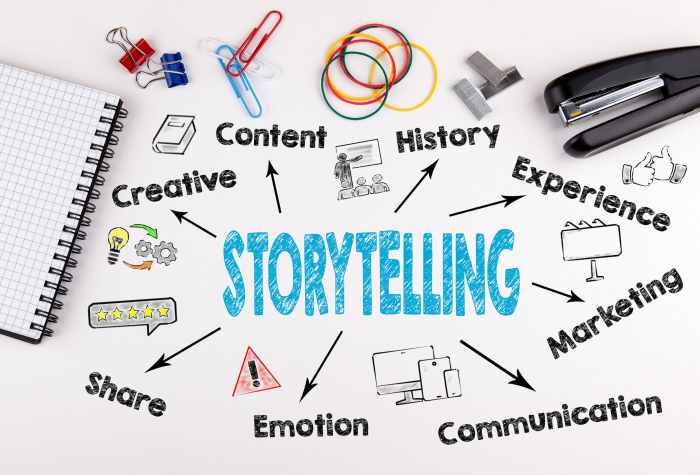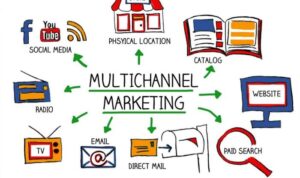Kicking off with Effective Storytelling in Marketing, this topic delves into the art of creating captivating narratives that drive successful marketing campaigns. From the importance of storytelling to strategies for implementation, this discussion explores it all.
Importance of Effective Storytelling in Marketing
Effective storytelling in marketing is all about crafting a narrative that resonates with your target audience, making your brand more relatable and memorable. It goes beyond just selling a product or service; it’s about creating an emotional connection that drives consumer engagement and loyalty.
Building Brand Identity
Effective storytelling helps to build a strong brand identity by communicating the values, mission, and unique selling points of your company. By sharing stories that highlight your brand’s personality and purpose, you can differentiate yourself from competitors and connect with consumers on a deeper level.
Creating Emotional Connections
Through storytelling, marketers can evoke emotions that inspire action and drive customer loyalty. By tapping into the power of emotions like joy, empathy, or nostalgia, brands can create lasting impressions that resonate with consumers long after they’ve encountered the marketing campaign.
Engaging with Customers
Storytelling allows brands to engage with customers in a more meaningful way, sparking conversations and fostering relationships. By sharing authentic stories that speak to the experiences and aspirations of their target audience, companies can create a sense of community and belonging that keeps customers coming back for more.
Examples of Successful Campaigns
– Nike’s “Just Do It” campaign: By telling stories of perseverance, courage, and triumph, Nike has built a powerful brand narrative that resonates with athletes and non-athletes alike.
– Coca-Cola’s “Share a Coke” campaign: This campaign personalized the brand by featuring people’s names on Coke bottles, encouraging customers to share a Coke with friends and loved ones, creating a sense of connection and nostalgia.
– Airbnb’s “Belong Anywhere” campaign: Through user-generated stories and photos, Airbnb showcases the diversity of its accommodations and promotes the idea of belonging anywhere in the world, appealing to travelers seeking unique and authentic experiences.
– Dove’s “Real Beauty” campaign: Dove challenged traditional beauty standards by featuring real women of all shapes, sizes, and ages in their ads, promoting self-acceptance and empowerment.
Elements of Effective Storytelling in Marketing
Effective storytelling in marketing involves several key elements that help create a compelling narrative to engage customers and drive brand awareness. These elements are crucial in capturing the audience’s attention and building a connection that resonates with them on an emotional level.
Key Elements of Effective Marketing Storytelling
- Character Development: Creating relatable characters that customers can connect with emotionally.
- Conflict and Resolution: Introducing a problem or conflict that the product or service can solve, leading to a satisfying resolution.
- Authenticity: Telling a genuine story that reflects the brand’s values and resonates with the target audience.
- Visual Imagery: Using visuals to enhance the storytelling experience and create a lasting impression.
Role of Emotions in Marketing Storytelling
Emotions play a crucial role in marketing storytelling as they help create a strong connection with the audience. When a marketing story evokes emotions such as joy, empathy, or excitement, customers are more likely to remember the brand and engage with the content. By tapping into the emotional aspect of storytelling, marketers can build trust and loyalty with their target audience.
Significance of a Compelling Narrative in Marketing Storytelling
A compelling narrative is essential in marketing storytelling as it helps captivate the audience and keep them engaged. A well-crafted story with a clear structure, relatable characters, and a meaningful message can leave a lasting impact on customers, influencing their purchasing decisions and brand perception. By developing a compelling narrative, marketers can effectively communicate their brand’s values and differentiate themselves in a competitive market.
Strategies for Implementing Effective Storytelling

Implementing effective storytelling in marketing campaigns can greatly enhance brand engagement and customer loyalty. Here are some tips on how to successfully incorporate storytelling into your marketing efforts:
Utilize Multiple Mediums
Storytelling can be executed through various mediums such as videos, blogs, social media posts, podcasts, and even interactive websites. By diversifying the platforms through which you tell your brand story, you can reach a wider audience and create a more immersive experience for your customers.
Create Compelling Narratives
Focus on creating narratives that resonate with your target audience. Use relatable characters, emotional arcs, and compelling conflicts to draw your audience in and keep them engaged. Make sure your brand story is authentic and aligns with your brand values to establish a genuine connection with your customers.
Showcase Customer Stories, Effective Storytelling in Marketing
Highlighting real-life customer stories and testimonials can add credibility to your brand and create an emotional connection with your audience. By sharing the experiences of satisfied customers, you can demonstrate the impact of your products or services and build trust with potential customers.
Collaborate with Influencers
Partnering with social media influencers or industry experts can help amplify your brand story and reach a larger audience. Influencers can help bring your brand story to life through their own unique storytelling style and engage their followers on behalf of your brand.
Examples of Brands Excelling in Storytelling
- Nike: Nike has successfully used storytelling in their marketing campaigns to inspire and motivate their audience. Their “Just Do It” campaign is a prime example of how a brand can create a powerful narrative that resonates with consumers.
- Dove: Dove’s “Real Beauty” campaign is another great example of effective storytelling. By challenging beauty standards and promoting self-acceptance, Dove has created a compelling brand story that has resonated with audiences worldwide.
- Apple: Apple is known for its innovative product launches that are accompanied by captivating storytelling. Their commercials and keynote presentations often focus on the emotional connection people have with their devices, creating a sense of belonging and loyalty among customers.
Measuring the Impact of Storytelling in Marketing: Effective Storytelling In Marketing

Storytelling is a powerful tool in marketing, but how do we measure its impact to ensure our efforts are successful? Let’s dive into the methods for measuring the effectiveness of storytelling in marketing campaigns.
Methods for Measuring Effectiveness
- Tracking Website Analytics: Monitor website traffic, bounce rates, and time spent on pages to see if storytelling is driving engagement.
- Social Media Metrics: Analyze likes, shares, comments, and follower growth to gauge the impact of storytelling on social platforms.
- Surveys and Feedback: Collect feedback from customers to understand how storytelling has influenced their perception of the brand.
Key Performance Indicators (KPIs)
- Sales Conversions: Measure the increase in sales or leads generated after implementing storytelling in marketing campaigns.
- Brand Mentions: Keep track of how often your brand is mentioned online or in conversations as a result of storytelling efforts.
- Customer Retention: Monitor customer loyalty and repeat purchases to assess the impact of storytelling on brand affinity.
Analyzing Consumer Engagement and Brand Awareness
- Content Performance: Evaluate the performance of storytelling content through engagement metrics like shares, comments, and likes.
- Sentiment Analysis: Use tools to analyze consumer sentiment towards the brand after exposure to storytelling content.
- Brand Recognition: Measure the increase in brand awareness and recognition among target audiences due to storytelling efforts.





